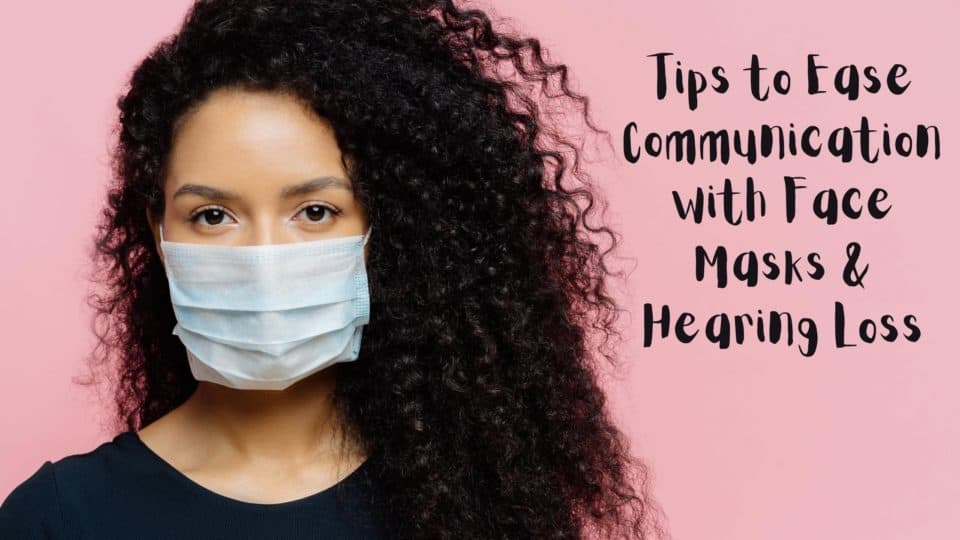- The Emotional Journey of Accepting Hearing Loss - October 25, 2024
- Making a Style Statement with Hearing Aids This Fall - October 15, 2024
- Fireplace Safety and Hearing aids - October 4, 2024
Wearing face masks has become integral to daily life and navigating public spaces. They are a critical safety measure practiced to prevent the spread of COVID-19. Though public health experts continue to emphasize the importance of wearing face masks, face masks make it more difficult to hear which presents unique challenges for people with impaired hearing. If you have hearing loss, you have probably experienced a tougher time hearing with face masks. Learn about how face masks contribute to communication challenges and ways you can maximize your hearing.
Impact of Face Masks on Communication
Face masks create barriers for communication in a variety of ways including the following:
- Muffles sound: fabric covering the mouth prevents the mouth from moving freely. This prevents people from fully enunciating words causing speech to sound muffled or slurred. This makes it more difficult to hear and distinguish individual words. Lack of clarity as well as sound quality affects the hearing and processing of speech.
- Blocks mouth: face masks also cover the mouth entirely which impacts hearing. People with hearing loss often use lip reading as a strategy to identify words and follow a conversation. Without access to the mouth, this becomes impossible which creates a barrier to conversations.
- Heightens other barriers: face masks muffle sound and block the mouth from being visible which create specific hearing challenges. This combined with other factors – being in a loud environment, multitasking, working etc. – can exacerbate hearing challenges.
Experiencing these barriers on a daily basis not only affects communication but can contribute to fatigue, social withdrawal, and stress. Because face masks have become a normalized component of everyday life, it is important to practice ways to best navigate communication with what has become daily attire.
Communication Tips with Face Masks
There are a few tips you can integrate to help communicate with masks while navigating hearing loss. The first important tip is to ensure that you can wear your hearing aids and mask comfortably. Be sure that your face masks are not too tight or too loose which could mean using masks that you are able to tie yourself. This ensures a comfortable fit for your hearing aids, ears, as well as for your mouth. Additional tips to help ease communication includes:
- Wait to start a conversation or speak until you have the person’s attention. You can do this by saying their name or waving.
- Be visible and make eye contact so that the other person can completely see you.
- Avoid settings with lots of background noise. Additional noise can be distracting, giving the brain more sound to process.
- Speak a little louder than you usually would. This is especially helpful while being socially distanced.
- Avoid raising your voice too much because excessively increasing the volume can further muffle sound.
- Ask for clarification when needed and check-in with the person you are communicating with to see if anything can be repeated.
- Emphasize other nonverbal cues like facial expressions, hand gestures, nodding your head etc. which helps provide more context for a conversation.
- Write down, email, or text detailed information that could be more challenging to share and hear with face masks.
- Avoid multitasking which can create more noise and distractions. It is important for everyone involved to be as present and focused as possible.
These tips can help maximize hearing while wearing face masks. You can also ask others what works best for them and how you can help create more accessible conversations.
Have Hearing Assessed
It is important to stay up to date with your hearing needs. Hearing loss exists on a spectrum – mild to profound so impairment can change over time. People should have their hearing assessed yearly to ensure that their hearing needs are being met. This is especially important during this time of wearing face masks because hearing aids are a critical tool that provide ample support with communication. Your hearing aids are adjusted to meet your specific hearing loss so if you experience changes, your device should be updated. Be sure to schedule an appointment with your hearing healthcare provider for a hearing test. This noninvasive and painless process will identify where your hearing capacity is in both ears which then informs effective treatment!

